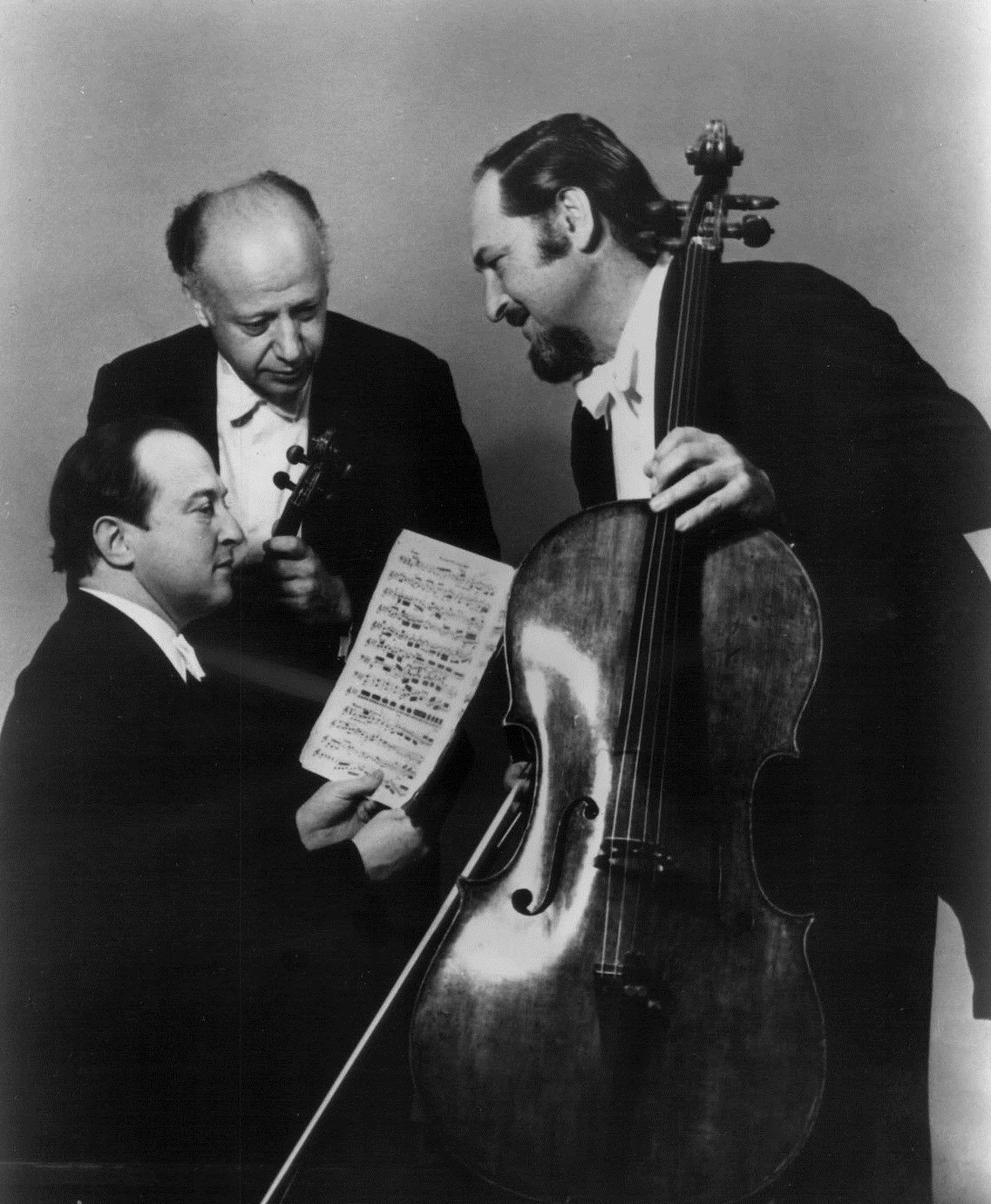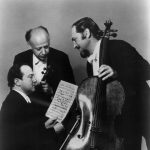
Beaux Arts Trio
The 2007-2008 season for the Beaux Arts Trio was nothing short of bitter-sweet: it marked the end of one of the most celebrated and revered chamber music careers of all time. After a stunning 53 years of consistent touring and performing which began on July 13th, 1955 at the Berkshire Music Festival–known today as the Tanglewood Music Festival–the members of the Beaux Arts Trio have taken their final bows on the concert stage. Described by many critics as being the end of an “era”, the Beaux Arts Trio has undoubtedly set the standard for performance of piano trio literature for all future generations.
Pianist and founding member Menahem Pressler, along with all of his Trio colleagues, violinist Daniel Hope and cellist, Antonio Meneses, ignited overwhelming enthusiasm from audiences around the world. From the United States to Russia, from Japan to Germany, from Israel to Brazil, this renowned ensemble’s extensive engagements have brought it the highest praise and ovations from all of the world’s major music centers including New York, Boston, Chicago, Washington D.C., London, Paris, Berlin, Munich, Vienna, Amsterdam, Moscow, Tel Aviv, Tokyo, Hong Kong and Sydney. Chosen as Musical America’s Ensemble of the Year in 1997, the Trio has been invited and re-invited by these centers for over 100 concerts and master classes each year. The Beaux Arts Trio’s superb musicians, distinguished history, comprehensive repertoire and expansive discography, contribute to its reputation as a hallmark of chamber music.
Through the years, the Beaux Arts Trio has maintained its freshness, while preserving its distinctive musical heritage. Founded by Menahem Pressler, Daniel Guilet, and Bernard Greenhouse, the Trio has evolved from the replacement of Guilet in 1969 with violinist Isidore Cohen, and the replacement of Greenhouse with cellist Peter Wiley in 1987. In June 1992, the Trio made its debut with violinist Ida Kavafian in two extraordinary performances of Beethoven’s Triple Concerto with the Gewandhaus Orchestra of Leipzig under Maestro Kurt Masur. Menahem Pressler created yet another legendary collaboration when he named violinist Young Uck Kim and cellist Antonio Meneses as new members in 1998. In their three seasons together, Pressler, Kim and Meneses earned highest praise from critics and audiences alike.
–From Menahem Pressler’s Official Site
Menahem Pressler, piano
Menahem Pressler, founding member and pianist of the Beaux Arts Trio, established himself among the world’s most distinguished and honored musicians, with a career that spanned almost six decades. He continued to captivate audiences throughout the world as performer and pedagogue, performing solo and chamber music recitals to great critical acclaim while maintaining a dedicated and robust teaching career.
Born in Magdeburg, Germany in 1923, Pressler fled Nazi Germany in 1939 and emigrated to Israel. Pressler’s world renowned career was launched after he was awarded first prize at the Debussy International Piano Competition in San Francisco in 1946. This was followed by his successful American debut with the Philadelphia Orchestra under the baton of Maestro Eugene Ormandy. Pressler’s extensive tours of North America and Europe have included performances with the orchestras of New York, Chicago, Cleveland, Pittsburgh, Dallas, San Francisco, London, Paris, Brussels, Oslo, Helsinki and many others.
After nearly a decade of an illustrious and praised solo career, the 1955 Berkshire Music Festival saw Menahem Pressler’s debut as a chamber musician, where he appeared as pianist with the Beaux Arts Trio. This collaboration quickly established Pressler’s reputation as one of the world’s most revered chamber musicians. With Pressler at the Trio’s helm as the only pianist for nearly 55 years, The New York Times described the Beaux Arts Trio as “in a class by itself” and the Washington Post exclaimed that “since its founding more than 50 years ago, the Beaux Arts Trio has become the gold standard for trios throughout the world.” The 2007-2008 season was nothing short of bitter-sweet, as violinist Daniel Hope, cellist Antonio Meneses and Menahem Pressler took their final bows as The Beaux Arts Trio, which marked the end of one of the most celebrated and revered chamber music careers of all time. What saw the end of one artistic legacy also witnessed the beginning of another, as Pressler continues to dazzle audiences throughout the world, both as piano soloist and collaborating chamber musician, including performances with the Juilliard, Emerson, American, and Cleveland Quartets, among many others.
–From Menahem Pressler’s Official Site
Isodore Cohen, violin
A genial, energetic musician whose interests ranged from Haydn to Elliott Carter, Mr. Cohen can be heard on dozens of classic recordings by the Beaux Arts Trio, including the complete Haydn and Beethoven Piano Trios and works by Tchaikovsky, Rachmaninoff, Ives and Shostakovich.
As the ensemble’s violinist, he held a pivotal position, physically as well as musically.
At the Casals festivals, Mr. Cohen met the violinist Alexander Schneider, who invited him to join the Schneider String Quartet as second violinist, in 1952. Among the Schneider Quartet’s accomplishments was a traversal, both in concert and on recordings, of the complete Haydn quartets. In 1958, Mr. Cohen joined the Juilliard String Quartet, also as second violinist. He performed with the group for a decade.
By the mid-1970’s, the Beaux Arts had become the world’s most prominent piano trio and was touring and recording plentifully. Mr. Cohen remained a member until his retirement in 1992.
During his years in the Juilliard and Beaux Arts groups, Mr. Cohen also taught, and was at various times a member of the faculties at the Aspen Festival, the Curtis Institute of Music in Philadelphia, the Juilliard School, Princeton University, the State University of New York at Stony Brook, and the Manhattan School of Music. His most long-standing association, though, was with Marlboro, where he began teaching in 1966. He regularly toured as part of Musicians from Marlboro, a flexible ensemble that included both faculty and student performers.
Bernard Greenhouse, cello
Bernard Greenhouse was probably best known as one of the founding members of the Beaux Arts Trio. Greenhouse had a significant career as a solo cellist both before formation of the trio and during his 32 years of service in it. A student of Casals, Greenhouse mastered a broad cello repertory in the chamber realm, from Haydn, Mozart, Beethoven, Schubert, and Brahms to Ives, Ravel, Rachmaninov, and Shostakovich. But, especially in his freelance work, he also regularly performed contemporary works, like the Elliott Carter Sonata for cello and piano, which he premiered. Greenhouse also taught cello throughout most of his career, holding posts at various times on the faculties of the Manhattan School of Music, the New England Conservatory, Rutgers University, and Juilliard. Greenhouse appeared on more than 50 recordings over the years, both as a member of the trio and as a freelance cellist. Most are available on the Philips labels, with a few scattered on Decca, DG, Sony, Boston Records, and PentaTone.
Bernard Greenhouse was born in Newark, NJ, on January 3, 1916. He began study on the cello at nine, and later sang briefly as a boy soprano. At 18 Greenhouse enrolled at Juilliard for studies with Felix Salmond. Following graduation Greenhouse joined the CBS Radio Orchestra (1938). He would soon become principal cello, but his rapid advancement did not deter him from further studies: later teachers would include Emanuel Feuermann and, from 1946-1948, Pablo Casals.
During the war Greenhouse served in the Navy, playing cello in the orchestra and oboe in the marching band. Greenhouse joined the Bach Aria Group, a vocal/instrumental ensemble, in 1948, and would appear regularly with the group until 1977. From the late ’40s to about 1960, Greenhouse also actively pursued a solo career. In the midst of all this activity he helped found the Beaux Arts Trio in 1955 with pianist Menahem Pressler and violinist Daniel Guilet.
Greenhouse would serve as cellist in the trio until 1987. With countless acclaimed tours abroad and numerous benchmark recordings, he served in what would become arguably the finest piano trio of its time.
Following retirement from the trio Greenhouse continued his activities as a teacher. In the late ’90s he retired from both Rutgers University and the New England Conservatory. Greenhouse did continue to offer master classes, and as late as 2008, when he was 92, he was still active in that capacity.

